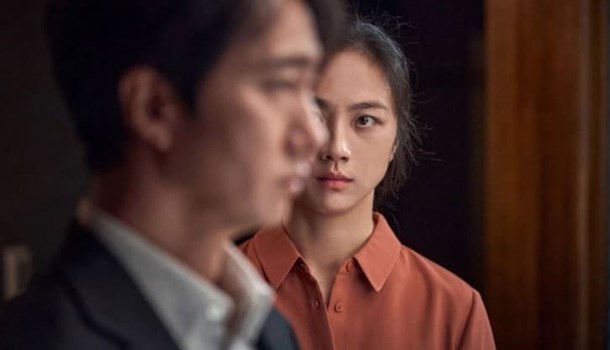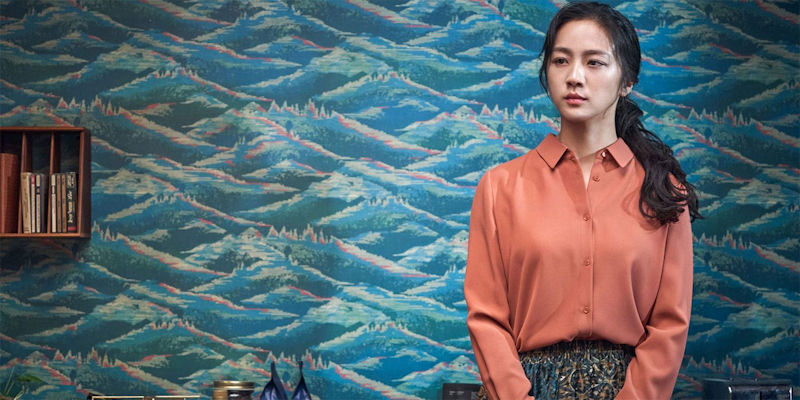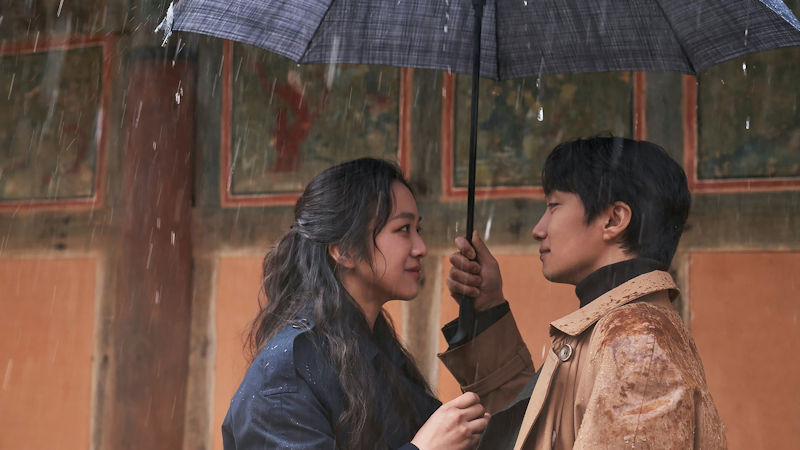
Written by Richard Durrance on 15 Mar 2023
Distributor MUBI • Certificate 15 • Price £14.99
It’s hard to describe what it was like seeing Park Chan-wook’s Oldboy (2003) when it first arrived in the cinema. A director I knew little about hitting me with a film that was one of the few that genuinely left me walking out of the auditorium feeling like I’d seen something extraordinary. Since then Park Chan-wook's work has never been dull, often hitting remarkable heights, The Handmaiden (2016) perhaps being the best since Oldboy.
I missed Decision to Leave at the cinema. It managed to come out in those two-weeks when I was both feeling shitty and was possibly contagious, so no cinema trip for me. Finally catching up with it on Blu-Ray meant giving it space and time to breathe, like a good wine, in order for me to approach it.
Basically, that means Sunday I really felt like watching it and so I did.
Insomniac detective, Jang Hae-jun (Park Hae-il) works and stakes-out criminals in Busan, seeing his wife only at weekends. Into his life, a cycle of no sleep and detective work enters Song Seo-rae (Tang Wei) the Chinese immigrant wife of an elderly ex-immigration officer. Hae-jun starts to fall for Seo-rae, despite his being married and her being a suspect in the murder of her husband...
For all the intentional simplicity of the synopsis, Decision to Leave has so much more going on, as characters start to unfurl and relationships slip and slide uneasily. Though much of the narrative as it unfolds can wander down obvious avenues, such as Hae-jun compromising himself to help Seo-rae, Park's trademark bloody humour is always there, often in counterpoint.
Hae-jun, as he stakes out Seo-rae while he cannot sleep, finds himself equally voyeuristically viewed by Seo-rae, only as she is watching him violently arrest a suspect in a long-running murder case. How Park frames each scene moves from arch black comedy to visual inventiveness, moving Hae-jun literally into the room of the woman he is watching, yet not always coming to the right conclusions despite all his intent. Whatever you think of the film you’d have to be an absolute cinematic miser not to recognise that Park’s skill as a director is often displayed to quite dazzling effect; Park manages to move the story and characters across spaces with a seamlessness that requires a marriage of technical skill and narrative understanding that is remarkable, yet he does so with such ease that it’s almost impossible not to be impressed. He did the same in The Handmaiden, and like the Handmaiden, Decision to Leave delivers its secrets slowly.
Yet whereas by the end The Handmaiden laid out its story with a path that left little doubt for ambiguity, I felt that throughout its run, Decision to Leave oozed ambiguity from its very pores. Other reviewers have tended to take the ending to be quite literal, but I feel like you can read it in all manner of ways, because throughout how Seo-rae relates to the detective who is falling in love with her is difficult to read. Is she falling for him, too? Yes, she helps him sleep, something no-one and nothing else can, but how does she view him? More so when Hae-jun moves to the ocean to live with his wife, who he no longer loves, and Seo-rae with her new husband (who you don’t think is long for this world) happen to 'meet' them in a market, Seo-rae having staked Hae-jun out; has she now fallen for this detective broken by his previous inability to be loved back by Seo-rae?
Seo-rae may suggest so but is she also manipulating him? Is the ending as definite as it suggests?

Again, I like the ambiguous approach, and though I suspect the more straightforward ending to be the intended take-away, there was something about the sheer gusto of Tang Wei’s performance as Seo-rae that made me feel she was slippery and untouchable, yet almost immensely emotionally sensitive. It’s fair to say that Wei’s performance is quite remarkable, as skilled as Park’s direction. I’d seen some notices suggesting her performance was something else and it really is; it’s not a showy performance but reminds me of Tony Leung in In The Mood for Love, in how Leung in that film so totally embodies the character and Wei is likewise. All the emotional complexities that we discover about her character seems to float under the surface in a performance of staggering control. It goes without saying she’s been ignored for rewards, likely because it is not a great, ebullient role, instead she shimmers with emotion, subtly displaying a range of feelings with a discreet ease that you struggle to imagine anyone else pulling off.
That Wei’s performance is so compelling helps carry the film because at two-hours and twenty minutes, I did feel the film petered out a little. Ironically considering the running time some aspects - Hae-jun's latter issues with his wife – feel sudden as well as under-developed, and the final act - though it ends with my likely-take-it-literally-but-I-don't-want-to ending which is arguably bang-on, for a while the film seems to lose its way a little, it starts to meander before getting itself back narratively on track. In some ways the film might have been better as a longer piece of prestige TV, though it is undeniably cinematic. Maybe the problem is for a while Hae-jun and Seo-rae are not together and it’s their ambiguous, sometimes ambivalent relationship that makes the film. Their scenes together have a subtle intimacy that is more remarkable for their apparent normality. It’s often here when Park’s direction really shines, though he equally focusses on Hae-jun's relationship to his fellow police-officers, who are often at odds with Hae-jun - yet again there are slippery love-hate relationships, like the one between Hae-jun and his headstrong underling, Soo-wan.
Despite my itchy feet through parts of the final act and my obstinate desire to read Decision to Leave as having a more fluid ending, it’s an elegant, sharply dark piece of filmmaking by a director who has really mastered his craft. It may not have the visceral power of Oldboy or the full-on narrative luxuriance of The Handmaiden, but it is still a far better film in terms of skill than you’ll likely to come across in most other cinematic delights you’ll likely watch this or any other year.
And in Tang Wei’s Seo-rae there is perhaps one of those pieces of acting that may grow over time into being seen as one of the great performances. It would certainly be deserved.


Long-time anime dilettante and general lover of cinema. Obsessive re-watcher of 'stuff'. Has issues with dubs. Will go off on tangents about other things that no one else cares about but is sadly passionate about. (Also, parentheses come as standard.) Looks curiously like Jo Shishido, hamster cheeks and all.
posted by Richard Durrance on 12 Feb 2026
posted by Richard Durrance on 10 Feb 2026
posted by Richard Durrance on 07 Feb 2026
posted by Richard Durrance on 03 Feb 2026
posted by Richard Durrance on 27 Jan 2026
posted by Richard Durrance on 19 Jan 2026
posted by Richard Durrance on 08 Jan 2026
posted by Richard Durrance on 17 Dec 2025